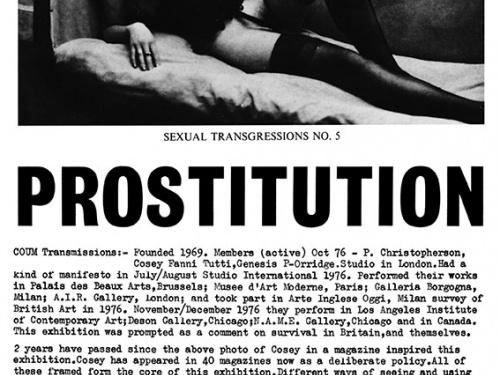Richard Hamilton at the ICA Reading List
The ICA Bookshop has put together a brand new reading list to accompany the latest exhibition Richard Hamilton at the ICA. All of the titles are available online or in our Bookshop on the Mall.
ICA 1946-1968
Anne Massey & Gregor Muir
£20
This is the first in-depth examination of this extraordinary birth and intellectual, sophisticated, creative early steps. No other book can claim to capture the founding spirit of this incredible organisation in quite the same way. The early ICA hosted the most important shows in the history of post-war British art, including Growth and Form, Parallel Of Life and Art, and Cybernetic Serendipity, as well as ground-breaking exhibitions by Bacon, Picasso and Pollock. Home to the Independent Group, the ICA became the maternity ward of Pop Art, Op Art and Brutalist Architecture. Obviously we are biased about this book, but really, take a look: the archival images alone would make Paul Rand emerald with envy.
Richard Hamilton (October Files)
Hal Foster
£13.95
Hal Foster has a couple of pieces (“Notes on the First Pop Age” and Citizen Hamilton”) in this MIT Press title which provides you with a solid rock of text to chisel your own Hamilton. It features a Michael Craig-Martin interview with Richard, going over collaboration with Roth, politics in art, Duchamp, the IG, etc. Additional texts from David Mellor (not that one), Greil Marcus and more (including four from Hamilton himself) make this rather serious looking book surprisingly juicy and nourishing.
Semblance and Event
Brian Massumi
£10.95
Curtain up. Steven Shaviro (Professor of English, Wayne State University) steps out from stage left to describe this one: "Semblance and Event is a book about the smallest things, and the biggest. Brian Massumi effectively overcomes what Gilles Deleuze once described as the 'wrenching duality' of aesthetics. Massumi brings together action and contemplation; he finds the extraordinary in the everyday, and vice versa. This is a book about the life in art, and the art in life: a political aesthetics for the twenty-first century.”
Relationscapes: Movement, Art, Philosophy
Erin Manning
£14.95
The dance of the not-yet, the elasticity of the almost and a mover’s guide to standing still are some of the themes covered in this new philosophy of movement which, amongst other things, develops the concept of “preacceleration.” Relationscapes also includes a compelling chapter on Etienne-Jules Marey’s strikingly beautiful machines which he invented to, “measure the imperceptible.”
The Two Cultures
CP Snow
£13.99
Scientists accused of cultural ignorance ask: “Can you describe the Second Law of Thermodynamics?” It’s the scientific equivalent of the cultural question: “Have you read any Shakespeare?” Fighting dirty, they can ask an even simpler question: “Can you describe mass?” Apparently the majority of the cleverest people in the western world have “about as much insight into it as their neolithic ancestors would have had.” CP Snow’s barnstorming Rede lecture is here, along with his thoughts about it four years later, a historical perspective, Snow’s life and more on the rolling brain wrestle between scientists and literary intellectuals.
The First Pop Age
Hal Foster
£19.95
Has Hal Foster ever let you down? No he has not. Once again, he knocks the ball (tin of tomato soup) out of the park (Tesco’s car-park) Five chapters of this book cover the heavyweights: Hamilton (Tabular image), Lichtenstein (Cliché image), Warhol (Distressed image), Richter (Photogenic image) and Ruscha (Deadpan image) in this remarkable, highly acclaimed book. Open any page and we’re confident you’ll find something which will convince you to buy.
Game Theory: A Very Short Introduction
Ken Binmore
£7.99
Did you switch queues in the supermarket today only to wait longer? Should you bid late on eBay for that WWSD wristband or buy now? (What would Spock do) Where would you be now if everything you ever did was absolutely the best possible choice? Game Theory considers how to play the games in life rationally/successfully. It also covers the sex ratio among bees... If you had bought and read this book already you would know that buying it if you haven’t is the correct thing for you to do now… Very simple…
Militant Modernism
Owen Hatherley
£9.99
Re-see the disgusting building you walk passed daily with a new love in your eyes and a skip in your step. Swoon at the brutal concrete jutting there and wink at that porridge grey slab, all because you have this book in your pocket. An energetic, highly entertaining re-examination of Modernism via Martian Marxism, Disneyficated Britain, Vorticist chavs, the Egyptian pyramids in Germany, the black CNN, Brechtian fun, Beckettian unfun, etc. etc.
Rhythmanalysis
Henri Lefebvre
£12.99
If anyone has ever told you that you don’t have rhythm tell them that Lefebvre strongly disagrees. (Nice to have a famous Marxist sociologist and philosopher sticking up for your dance moves.) According to Henri, we all have rhythm. The introduction states: “This little book does not conceal its ambition. It proposes nothing less than to found a new science, a new field of knowledge: the analysis of rhythms.” From the “Critique of Everyday Life,” series, this book outlines a method for analysing the rhythms of urban spaces and the effects of those rhythms on the inhabitants of those spaces.
Reyner Banham: Historian of the Immediate Future
Nigel Whiteley
£16.95
This intellectual biography is the first comprehensive critical examination of Banham's theories and ideas, not only on architecture but also on the wide variety of subjects that interested him (and hopefully you). It covers the full range of his oeuvre and discusses the values, enthusiasms, and influences that formed his thinking. One of the most influential writers on architecture, design, and popular culture from the mid-1950s to the late 1980s, Banham is a mind to savour.
The Independent Group
Anne Massey
£17.99
Just about any question, query or quibble you have about the Independent Group is answered in this sweeping historical fact storm of a book by Anne Massey. Lots of the action takes place in the ICA, talks on helicopters, proteins, non-Aristotelian Dadaists,
The Duchamp Effect
Buskirk & Nixon
£18.95
The fact that Warhol, Oldenburg, Louise Lawler, Ed Ruscha (and more) are interviewed about Duchamp in this book make it worth the money alone, but it also contains Richard Hamilton’s typographical tussle with Marcel’s Green Box, Hal Foster on Neo-Avant-Garde and something Hamilton called a “freak object.”
The Atrocity Exhibition
JG Ballard
£7.99
Richard Madeley’s new book is not called "Plans for the Assassination of Jacqueline Kennedy," or "Why I Want to Fuck Ronald Reagan," perhaps because Ballard had used those titles in this collection of condensed novels. William Burroughs writes the preface (not to Richard’s book) for this experimental collection in which the protagonists ultimate goal is to start World War III, "though not in any conventional sense" a war that will be fought entirely within his own mind. An absolute must if you’re in to psychosexual experiments involving the positioning of objects in the geometry of space time.
The Machinic Unconscious
Felix Guattari
£12.95
“First of all, what is this unconscious really?” Combining theoretical research from fields as diverse as cybernetics, semiotics, ethnology, and ethology, Guattari reintroduces into psychoanalysis a "polemical" dimension, at once transhuman, transsexual, and transcosmic, that brings out the social and political, the "machinic" potential of the unconscious. It also casts Proust’s characters from In Search of Lost Time as abstract mental objects, mapping the separation between literature and science which of course brings us back to CP Snow’s book mentioned above.
Speed and Politics
Paul Virilio
£10.95
What would an ICA reading list be without a semiotext(e) title? A sham! Paralleling Heidegger's account of technology, Virilio's vision intriguingly sees speed (not class or wealth) as the primary force shaping civilization and a militarized society. In this "technical vitalism," multiple projectiles, the "metabolic bodies" of soldiers, transport vessels, and now information and computer technology are launched in a permanent and immediate assault on the world and on human nature. It sounds heavy but it zips by like Marinetti on a motorbike.
All of these books are available to purchase in the ICA Bookshop, either online or in person. Please visit us to see our full range of books, magazines, and self published material.
This article is posted in: Blog, Store
Tagged with: Richard Hamilton, London, ICA, Anne Massey & Gregor Muir, Hal Foster, Brian Massumi, Erin Manning, CP Snow, Ken Binmore, Owen Hatherley, Henri Lefebvre, Nigel Whiteley, Anne Massey, Buskirk & Nixon, JG Ballard, Felix Guattari, Paul Virilio





